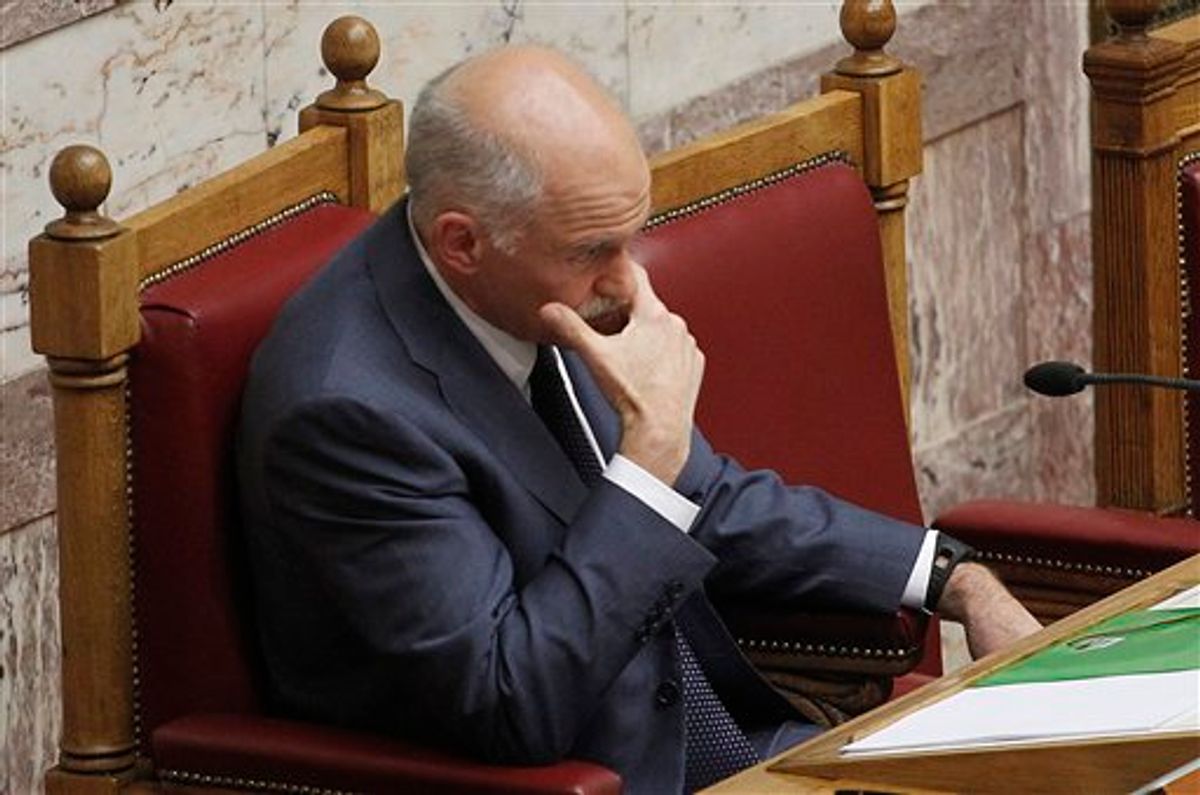Greek Prime Minister George Papandreou replaced his finance minister Friday in a broad cabinet reshuffle that won strong support from markets, optimistic that crucial austerity measures will now be passed to prevent a devastating near-term debt default.
After two days of political chaos that threatened to bring down the government, Germany also appeared ready to provide billions more in aid to carry the debt-ridden country through 2014. German Chancellor Angela Merkel indicated that the private sector would not be forced to share in the pain of a second bailout.
Together, the developments in Athens and Berlin boosted hopes Greece will get a second bailout and avoid a default, which at one point on Wednesday seemed to be just weeks away. Yields on Greek 10-year bonds dropped more than a percentage point to the still sky-high level of just under 17 percent, while the Athens Stock Market closed up 3.8 percent at 1,254.02.
Despite the more benign market backdrop Friday, Greece faces years of trying economic times if it is going to get on top of its euro350 billion debt mountain.
"The country must be saved and it will be saved," said Evangelos Venizelos, who moves from the defense ministry to take over the reins at the finance ministry. "I am leaving defense today to go to the real war."
By promoting Venizelos, who challenged Papandreou for the party leadership four years ago, to the finance ministry from the defense department, Papandreou will hope he met demands of his deputies so that the new package will get passed. At a dramatic seven-hour meeting Thursday, Socialist lawmakers demanded he remove inexperienced loyalists from the Cabinet and replace them with more experienced party veterans.
"We are facing the greatest threat our country has experienced in recent decades," the prime minister told his ministers at the first meeting of his new cabinet.
"We are again at a critical juncture in the middle of a difficult negotiation that is crucial for the future of the country -- for an immediate solution of a major national problem, the problem of debt that threatens to destroy us and destroy the lives of millions of Greeks," he said.
Papandreou has struggled to garner support for a crucial new package of euro28 billion ($39.5 billion) in spending cuts and tax hikes demanded by the EU and International Monetary Fund, which granted Greece's first bailout fund last year in return for austerity measures. The package must be voted through parliament this month if the country is to continue receiving funds from its bailout.
Venizelos, who is expected to attend a meeting of eurozone finance ministers in Luxembourg Sunday, renewed a call to the opposition Conservatives to join the effort of reforming Greece's economy.
Papandreou had tried to face down a political crisis by negotiating with the conservatives to form a coalition government earlier this week, but the talks quickly collapsed.
His reshuffle is partly a response to the failure of those talks and the hope is that the appointment of Venizelos, the 57-year-old constitutional law professor, will give Papandreou the necessary votes in Parliament, where his Socialists have a majority of five seats.
Venizelos is considered Papandreou's main internal Socialist rival. A veteran of several ministries, he handled the run-up to Greece's hosting of the Olympic Games in 2004 as culture minister, and has also held the justice, development and transport portfolios in the past.
He replaces George Papaconstantinou, who became broadly unpopular as he imposed budget cuts and tax hikes as part of last year's euro110 billion international bailout deal. Papaconstantinou retains a ministerial position.
Government portfolios were also redistributed to address demands for faster reform from Greece's debt monitors at the European Union and IMF. A new ministry for administrative reform was created to help scale back the country's bloated public sector.
Venizelos' immediate task is to get on top of budget slippages and setbacks in cost-cutting reforms as well as pushing ahead with a massive privatization drive worth euro50 billion ($70.5 billion). At the same time, he will have to negotiate a vital second bailout package with Greece's frustrated international creditors.
All this though hinges on whether Papandreou's new government wins a confidence vote in Parliament, likely at midnight on Tuesday.
Socialist dissenters have given no indication they will vote against the government, but one rebel said he would not back new austerity measures without "major changes."
If the government clears that hurdle, there appears to be a greater chance that Greece will get a second bailout after Germany's Merkel agreed with French President Nicolas Sarkozy that private investors should be part of the solution but that their participation had to be "voluntary."
That was interpreted as somewhat of a climbdown by Merkel.
"As of last night, there were two main obstacles to sealing a package for Greece: disagreement among European policymakers, and Greek politics," said Nicola Mai, an analyst at JPMorgan. "Following a meeting between Merkel and Sarkozy this morning, the first of these two obstacles appears to have been lifted."
The government has also promised to slash its bloated public service by 150,000 people by 2015 and effectively end government jobs for life. The privatization program will also have to kick up a gear or two, particularly in the energy sector, which will now be overseen by former finance chief Papaconstantinou.
Dealing with the euro350 billion debt burden is going to take years to overcome. Many in the markets still think it's an impossible job and that a default sometime in the future is inevitable.
--------
Gabriele Steinhauser in Brussels contributed.



Shares